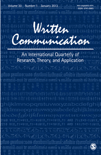
WRITTEN COMMUNICATION
Scope & Guideline
Cultivating Insights into the Power of Written Words
Introduction
Aims and Scopes
- Interdisciplinary Approaches to Writing Studies:
The journal integrates perspectives from linguistics, education, sociology, and rhetoric, emphasizing the multifaceted nature of writing and its implications in various fields. - Empirical Research on Writing Practices:
It publishes empirical studies that investigate writing behaviors, processes, and outcomes in educational, professional, and social contexts, contributing to evidence-based practices in teaching and writing research. - Focus on Genre and Discourse Analysis:
A significant emphasis is placed on genre theory and discourse analysis, exploring how different genres influence writing practices and the understanding of communicative purposes. - The Role of Technology in Writing:
The journal examines the impact of digital tools and platforms on writing practices, including collaborative writing, online communication, and the evolving nature of literacy in digital contexts. - Writing as a Tool for Learning and Argumentation:
It investigates how writing serves as a mechanism for learning, critical thinking, and argumentation across various disciplines, highlighting its educational significance.
Trending and Emerging
- Digital Writing and Communication:
Research focusing on digital writing practices, including the use of social media and collaborative online platforms, has surged, highlighting how technology transforms writing and communication. - Writing in Multilingual and Multimodal Contexts:
There is an increasing emphasis on multilingual writing and the integration of multiple modes of communication, reflecting the diverse linguistic backgrounds of students and the complexity of modern communication. - Critical Pedagogy and Social Justice in Writing:
Emerging themes center around critical pedagogy, exploring how writing can be a means of social justice and empowerment, particularly for marginalized communities. - Interdisciplinary Collaboration in Writing Research:
The trend towards interdisciplinary research is growing, with studies exploring writing across various disciplines, such as STEM fields and social sciences, emphasizing the importance of writing in diverse contexts. - The Role of Feedback and Revision in Writing Development:
An increased focus on the processes of feedback and revision highlights their critical role in writing development, with studies examining peer review, instructor feedback, and self-assessment practices.
Declining or Waning
- Traditional Rhetorical Analysis:
There has been a noticeable decline in the publication of papers focused solely on classical rhetorical analysis, as the field has increasingly shifted towards more empirical and interdisciplinary approaches. - Static Writing Models:
Research centered on static or prescriptive models of writing, such as formulaic approaches to composition, is becoming less common, as scholars advocate for more dynamic and context-sensitive frameworks. - Studies Isolated from Sociocultural Contexts:
Papers that do not consider the sociocultural dimensions of writing are appearing less frequently, indicating a growing recognition of the importance of context in understanding writing processes.
Similar Journals
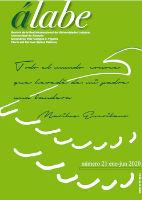
Alabe-Revista de Investigacion sobre Lectura y Escritura
Connecting researchers and practitioners for impactful learning.Alabe-Revista de Investigacion sobre Lectura y Escritura is a prestigious academic journal published by Universidad de Almería, dedicated to the exploration and advancement of literacy studies and writing research. Established as an Open Access journal since 2010, it is committed to providing a platform for innovative research and interdisciplinary discussions that span linguistic, educational, and psychological perspectives on reading and writing. With a focus on enhancing pedagogical practices and fostering literacy development in diverse contexts, Alabe aims to bridge the gap between academic scholarship and practical application. Researchers, educators, and students alike will find this journal's critical insights and scholarly contributions to be invaluable resources for deepening their understanding of reading and writing processes. Through its connections with academic networks and commitment to high-quality research outputs, Alabe plays an essential role in shaping the future of literacy studies.
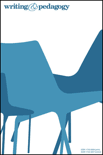
Writing & Pedagogy
Transforming Education Through Writing InsightsWriting & Pedagogy is a renowned academic journal published by EQUINOX PUBLISHING LTD that aims to explore the dynamic interplay between writing and teaching methodologies within the fields of education and linguistics. Since its launch, the journal has rapidly become a vital resource for scholars, practitioners, and students interested in the evolving landscape of literacy, composition, and educational practice. The journal is indexed in Scopus, highlighting its relevance and contribution to the fields, with a current ranking of #499 in Language and Linguistics and #578 in Social Sciences within Linguistics. With a Q4 classification in Education and a Q3 classification in Linguistics and Language as of 2023, it reflects a commitment to quality scholarship while offering open access to a wide range of articles that promote innovative pedagogical approaches. As the journal converges from 2018 to 2023, it continues to attract contributions that push the boundaries of traditional discourse, making it an essential read for anyone engaged in the vital work of writing education and pedagogy.
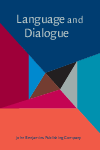
Language and Dialogue
Exploring the Intersections of Language and CultureLanguage and Dialogue is an esteemed journal published by JOHN BENJAMINS PUBLISHING CO, focusing on the interdisciplinary intersections of language use, cultural studies, and literary theory. With an ISSN of 2210-4119 and an E-ISSN of 2210-4127, the journal has established itself as a prominent platform for high-quality research since its inception in 2011. Notably, it is ranked Q1 in Cultural Studies and Literature and Literary Theory, reflecting its prestigious standing in these fields, and has impressive Scopus rankings that further underline its scholarly impact within the arts and humanities. Based in the Netherlands, Language and Dialogue is committed to advancing the understanding of dialogue's role in language and communication, providing a vital resource for researchers, professionals, and students alike. Although not an Open Access journal, it ensures access to cutting-edge research through institutional subscriptions, making it an essential addition to any academic collection in the humanities and social sciences.
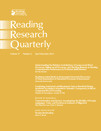
READING RESEARCH QUARTERLY
Innovating literacy education for a brighter future.READING RESEARCH QUARTERLY is a premier academic journal dedicated to advancing the understanding of reading research within the domains of educational psychology and literacy development. Published by Wiley, this journal has been a vital resource for researchers, educators, and practitioners, featuring empirical studies, theoretical papers, and comprehensive reviews since its inception. With a remarkable impact factor and consistently ranked in the Q1 quartile for both Developmental and Educational Psychology and Education, it stands out as an authoritative source in the field. Notably, it possesses a strong international presence, evidenced by its Scopus rankings, sitting in the top 3% for educational social sciences and within the top 5% for developmental psychology. Although currently not offering Open Access, the journal ensures that its contributions are accessible through institutional subscriptions. By linking theoretical frameworks with practical applications, READING RESEARCH QUARTERLY serves as an essential platform for fostering innovation and collaboration among scholars and practitioners aiming to enhance literacy education and understanding.
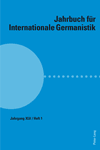
JAHRBUCH FUR INTERNATIONALE GERMANISTIK
Unlocking New Perspectives in German Literary TheoryJAHRBUCH FUR INTERNATIONALE GERMANISTIK is a prominent academic journal published by VERLAG PETER LANG AG, dedicated to advancing research in the fields of German studies, literature, and linguistics. With its ISSN 0449-5233 and E-ISSN 2235-1280, this journal provides a platform for scholarly discourse, critical analysis, and innovative studies related to German language and literary theory. Although its coverage in Scopus was discontinued in 2014, the journal continues to be influential within the academic community, evidenced by its rankings in the Arts and Humanities and Social Sciences categories. Specifically, it holds a rank of #397 in Literature and Literary Theory and #477 in Language and Linguistics, reflecting a solid presence among peers. Researchers and students alike can benefit from its insightful articles that delve into various dimensions of Germanistik, thereby fostering a greater understanding of language and cultural contexts. For those interested in contributing to this field of study, JAHRBUCH FUR INTERNATIONALE GERMANISTIK serves as an essential resource for high-quality scholarly content.
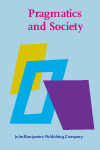
Pragmatics and Society
Advancing Understanding through Language UsePragmatics and Society, published by John Benjamins Publishing Co, is an esteemed journal that serves as a vital platform for the interdisciplinary exploration of language use in social contexts. Established with the aim of bridging the gap between pragmatics and social theory, this journal covers innovative research and critical methodologies within linguistics and language studies. With an impressive impact factor and recognition as a Q2 journal in the field of Linguistics and Language for 2023, it ranks notably within the 75th percentile for Arts and Humanities and 73rd for Social Sciences. Based in the Netherlands, Pragmatics and Society is dedicated to fostering scholarly discussions and advancing knowledge in areas such as discourse analysis, sociolinguistics, and communicative practices. Researchers, professionals, and students alike will find this journal to be an invaluable resource for understanding the complexities of language in society and are encouraged to engage with its rigorous publications.

TESL Canada Journal
Bridging Theory and Practice in Language LearningTESL Canada Journal, published by TESL Canada, serves as a vital resource for researchers, educators, and practitioners in the field of English as a Second Language (ESL) and applied linguistics. With its commitment to advancing scholarship and best practices in language education, this esteemed journal fosters a platform for the dissemination of high-quality research and innovative pedagogical approaches. Although it operates without open access, its comprehensive articles and reviews offer valuable insights into current trends and challenges faced by ESL educators across Canada and internationally. The journal is dedicated to promoting a deeper understanding of language acquisition processes and instructional methodologies, contributing significantly to the professional development of its readership. Located in Burnaby, Canada, the journal aims to bridge the gap between theory and practice, making it an indispensable source for educators and researchers looking to enhance their expertise in ESL education.
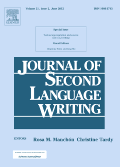
JOURNAL OF SECOND LANGUAGE WRITING
Fostering Excellence in Multilingual Writing CompetenceJOURNAL OF SECOND LANGUAGE WRITING, an esteemed publication of PERGAMON-ELSEVIER SCIENCE LTD, serves as a pivotal resource in the fields of Education and Linguistics, exhibiting a remarkable impact factor that solidifies its standing in the academic community. Established in 1992, this journal has consistently provided a platform for high-quality research and discourse, with its articles rigorously peer-reviewed to ensure scholarly integrity. Holding Q1 rankings in both Education and Linguistics for 2023, it is recognized for its influence in shaping the field of second language acquisition and pedagogy. With impressive Scopus rankings that place it in the 98th percentile among peers, the journal attracts a diverse readership comprising researchers, educators, and students eager to explore the intricacies of second language writing. Its focus encompasses theoretical research, practical applications, and innovative methodologies that enrich the field, making it an essential resource for those dedicated to understanding and enhancing the writing skills of second language learners.

READING AND WRITING
Advancing Understanding of Reading and Writing DynamicsREADING AND WRITING is a premier academic journal dedicated to exploring the interdisciplinary fields of education, linguistics, neuropsychology, and speech and hearing. Published by Springer, this journal has established itself as a leading platform for high-quality research, reflected in its impressive Q1 ranking across various disciplines in the 2023 journal quartiles. Covering significant advancements from its inception in 1989 through to 2024, READING AND WRITING emphasizes the critical interplay between reading and writing skills and their cognitive, linguistic, and educational implications. With its broad scope and commitment to advancing knowledge, this journal is invaluable for researchers, educators, and students aiming to deepen their understanding of literacy development and its impact on learning and communication. Although it operates without an open access model, the journal's rigorous peer-review process assures that published articles meet the highest academic standards, making it a reliable source of novel insights in these interconnected fields.
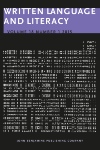
Written Language and Literacy
Elevating the Dialogue on Language and Literacy StudiesWritten Language and Literacy is a leading academic journal that has been at the forefront of language and literacy research since its inception in 1998. Published by John Benjamins Publishing Co in the Netherlands, this journal provides a platform for innovative and rigorous studies exploring the intersections of language, literacy, and cognitive processes. With an impressive impact factor and classified in the Q2 category for Linguistics and Language, it offers valuable insights and methodologies that contribute significantly to the field. The journal ranks 498th out of 1088 in Arts and Humanities and 577th out of 1167 in Social Sciences, placing it firmly within the academic conversation on language studies. Though it does not offer open access, it remains highly sought after by researchers, professionals, and students, ensuring a rich collection of knowledge essential for advancing literacy and language practices in diverse contexts.